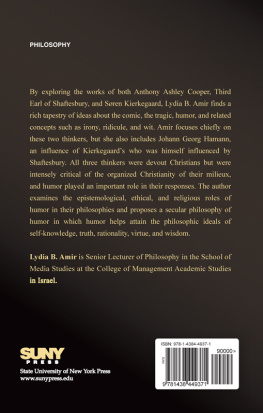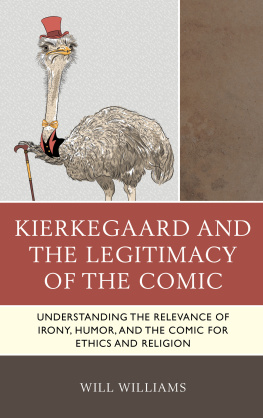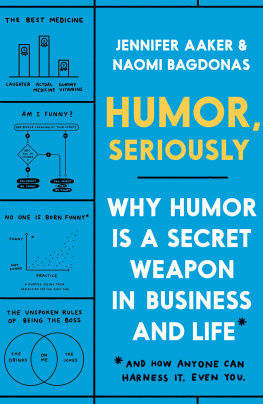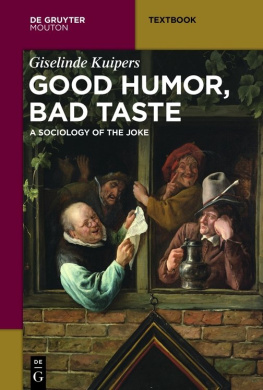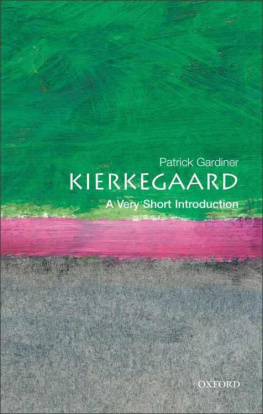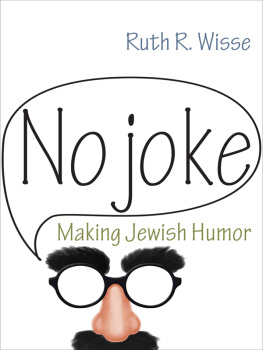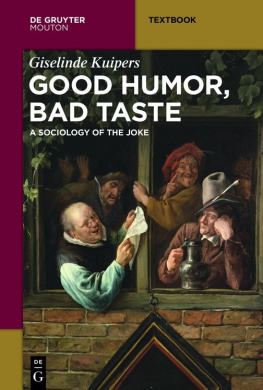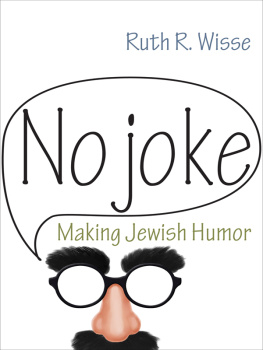HUMOR AND THE GOOD LIFE
IN MODERN PHILOSOPHY
HUMOR AND THE GOOD LIFE
IN MODERN PHILOSOPHY
S HAFTESBURY , H AMANN , K IERKEGAARD
Lydia B. Amir
Cover: Jan Steen. The dancing lesson. 16601679. oil on panel. 68.5 59 cm (27 23.2 in). Amsterdam, Rijksmuseum Amsterdam.
Published by State University of New York Press, Albany
2014 State University of New York
All rights reserved
Printed in the United States of America
No part of this book may be used or reproduced in any manner whatsoever without written permission. No part of this book may be stored in a retrieval system or transmitted in any form or by any means including electronic, electrostatic, magnetic tape, mechanical, photocopying, recording, or otherwise without the prior permission in writing of the publisher.
For information, contact State University of New York Press, Albany, NY
www.sunypress.edu
Production by Eileen Nizer
Marketing by Fran Keneston
Library of Congress Cataloging-in-Publication Data
Amir, Lydia.
Humor and the good life in modern philosophy : Shaftesbury, Hamann, Kierkegaard / Lydia Amir.
pages cm
Includes bibliographical references (pages) and index.
ISBN 978-1-4384-4937-1 (hardcover : alk. paper)
1. Life. 2. Wit and humor. 3. Shaftesbury, Anthony Ashley Cooper, Earl of, 16711713. 4. Hamann, Johann Georg, 17301788. 5. Kierkegaard, Sren, 18131855. I. Title.
BD435.A58 2014
128dc23
2013003304
10 9 8 7 6 5 4 3 2 1
CONTENTS
Chapter 1
Shaftesbury: Ridicule as the Test of Truth
Intermezzo
Hamann: Humor and Irony as Categories of Understanding
Chapter 2
Kierkegaard: Humor as Philosophy at its Best
Chapter 3
Humor and the Good Life
LIST OF ABBREVIATIONS
The following abbreviations are used in the text, followed by page numbers indicated by Arabic numerals. Roman capital letters indicate parts, books or volumes, and Roman lower-case letters indicate chapters.
WORKS BY ANTHONY ASHLEY COOPER SHAFTESBURY
CR: Characteristics of Men, Manners, Opinions, Times, etc., ed. John M. Robertson, in two volumes, 1963
CR3: Characteristics of Men, Manners, Opinions, Times, etc., 6th edition, corrected, in three volumes, 1737
Inquiry: Inquiry Concerning Virtue or Merit
Letter: Letter Concerning Enthusiasm
Life: The Life, Unpublished Letters, and Philosophical Regimen of Anthony, Earl of Shaftesbury
Misc.: Miscellaneous Reflections on the Preceding Treatises, and other Critical Subjects
Moralists: The Moralists, a Philosophical Rhapsody
P.R.O.: The Shaftesbury Papers in the Public Record Office in at Kew, Surrey.
Essay: Sensus Communis, an Essay on the Freedom of Wit and Humour
Soliloquy: Soliloquy, or Advice to an Author
WORKS BY SREN KIERKEGAARD
AC: Attack upon Christendom
CA: The Concept of Anxiety
CD: Christian Discourses
CI: The Concept of Irony with Constant Reference to Socrates
COR: The Corsair Affair
CUP: Concluding Unscientific Postscript, edit. and trans. by Howard V. Hong and Edna H. Hong.
CUPL: Concluding Unscientific Postscript, trans. by David F. Swenson and Walter Lowrie.
ED: Edifying Discourses
EO: Either/Or
FSE: For Self-Examination. Judge For Yourself!
FT: Fear and Trembling
JC: Johannes Climacus, or De omnibus dubitandum est
JP: Journals and Papers
PA: The Present Age
Pap.: Papirer
PC: Practice in Christianity
PF: Philosophical Fragments
PV: The Point of View for My Work as an Author
R: Repetition
SLW: Stages on Lifes Way
SUD: The Sickness unto Death
SV: Samlede Vrker
TC: Training in Christianity
WL: Works of Love
ACKNOWLEDGMENTS
I am deeply indebted to Erin Kelly, Lionel McPherson, and Yehuda Shavitwonderful philosophers and dear friendsfor their practical help, commendable patience, and unflinching support. The initial research for the book was facilitated by the help of Sarah Blatcher Cohen and Gary Cohen, who promised to change my life, and did.
I am indebted to Simon Critchley for alerting me to the importance of Shaftesbury and to the Kierkegaard Research Center in Copenhagen for hosting me. I express my heartfelt gratitude to Larry Ventis and Larry Mintz, who hosted me as a visiting scholar respectively at the College of William and Mary, Williamsburg, Virginia, and at the University of Maryland, Maryland. In Williamsburg, I enjoyed the colleges updated library on humor as well as the support and interest of John Morreall, who, at the time, had written all the major books on philosophy and humor. I am deeply grateful to him.
I am truly obliged to the philosophers who commented on previous drafts of the monograph: Erin Kelly, Yehuda Shavit, Noa Shein, Alicia Tessler, Yair Shlein, and Eli Benzaquen. I am grateful to David Segal and Itay Ehre for their advice on subjects pertaining to their respective areas of expertise.
I owe much to the patience of various English editors: Judi Felber, Kate Neptune, David Kelly-Hedrick, and especially Linda Landau, who managed to guide the work to completion.
I wish to express my gratitude to my colleagues and friends at the International Society for Humor Studies, the International Society for Value Inquiry, and the various associations of Practical Philosophy for their sustained interest in and support of my work.
I owe particular thanks to my faithful assistants, the staff and academics of my department, especially Simi Sarig, Hillel Nossek and Eva Berger, who supported my research. The extraordiany help of the librarians at the College of Management, Rishon LeZion, Israel, and the College of William and Mary, Williamsburg, Virginia, is greatly appreciated.
I am especially grateful to my parents and my loyal friends for their patience, support, and love.
Last but not least, I wish to express my gratitude for the financial support provided for this research, first, by the chairs of the School of Media Studies (Arnon Zuckerman) and the Department of Behavioral Sciences (Amichai Zilberman) at the College of Management, Rishon LeZion, Israel; and, later, by the Research Fund of the Research Authority (Hillel Nossek, Zvi Safra, Seev Neumann) of the College of Management Academic Studies, Rishon LeZion, Israel. The former enabled me to start the research, and the latter, to bring it to completion.
INTRODUCTION
The aim of this study is to investigate the role of humor in the good life. Various disciplines, such as medicine, psychology, and the social sciences, have praised humor for its individual and social benefits. However, the question of the good life is fundamentally a philosophical question; it is important to inquire into whether philosophers have given humor any role in the good life.
Although philosophers have always been interested in laughter, the accepted view is that they have rarely approved of it as a practice or as a subject worth exploring. Still, I suggest that a thorough study of ancient philosophy reveals a variety of relations between philosophy and the comic that have been epitomized in legendary figures such as the ridiculous philosopher (Thales), the laughing philosopher (Democritus), and the comical philosopher (Socrates). This relationship is also seen in the conceptions and practices of philosophy as comedic (Plato, the Cynics) and in views that associate the comic with the ideal of the gentlemanwit as a virtue (Aristotle)or with human nature in generallaughter as the mark of the human (Aristotle). These relations between philosophy and the comic developed into traditions in Antiquity that have survived throughout the Middle Ages and flourished in the Renaissance before being rediscovered in the Modern era. Before the eighteenth century, however,

